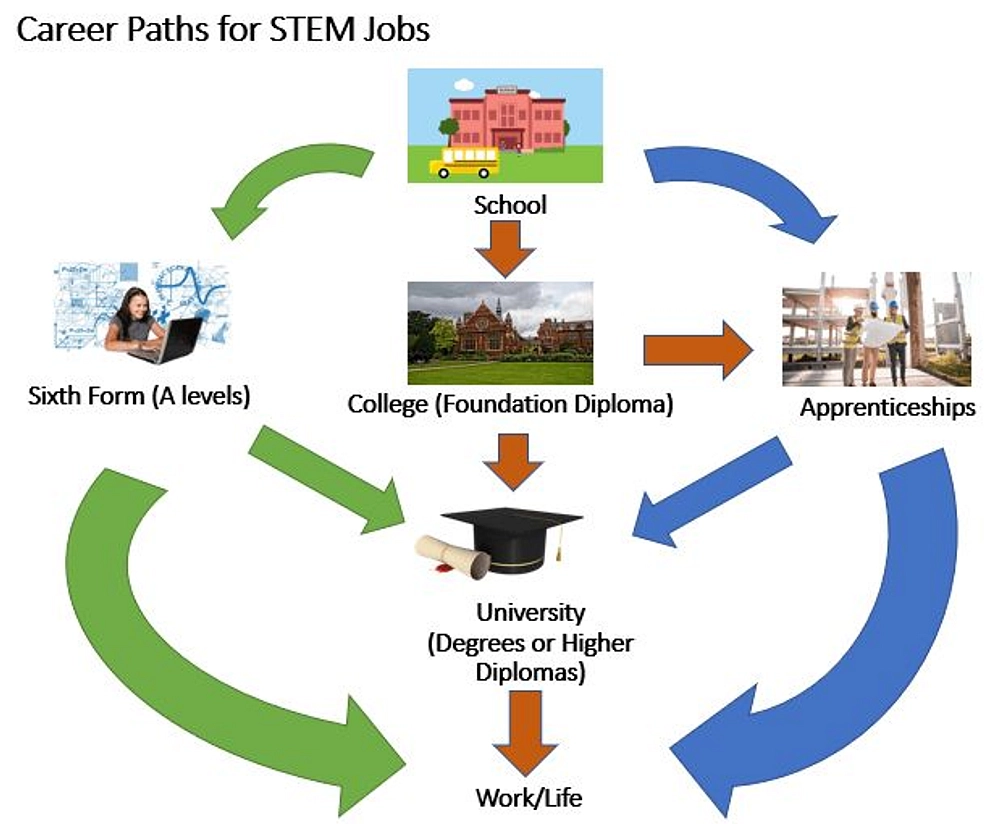I have worked as an engineer, teaching assistant and a supply teacher at various educational institutions. In this article, I'm going to discuss options for Science, Technology, Engineering and Mathematics (STEM) career paths. I will also weigh in from my personal educational and work experience to help you gain a better understanding of the choices you have available after secondary school.

There are three major routes to STEM careers in the UK. You can either complete an apprenticeship, a diploma at college or a university degree. I would not say one is better than the other as it all depends on what your personal goals and preferences are. Please do note that some professions, such as a doctor, will require you to complete a five-year degree. The qualifications in the UK are classed into different levels. I recommend visiting this link to get a better understanding of what these qualification levels mean. It is possible to start at a lower level qualification and climb your way up to a higher level qualification. In a recent study it was found that 87% of STEM graduates hired into graduate level-jobs but only half of that proportion (46%) worked in Highly Skilled (HS) STEM positions. What does this mean? It means that you don't have to necessarily go down the traditional route of going to university to end up in an HS STEM job. The chart below better illustrates the paths available to you. Now let's discuss some of these.
Apprenticeships
Apprenticeships are offered at four levels. These are intermediate, advanced, higher and degree level. Generally speaking intermediate and advanced apprenticeships will require 2-4 GCSE's (including Maths and English). However, it is possible to enter into apprenticeships without these grades, but this will depend on the employer, and they may ask for work experience as a substitute. The higher level and degree level apprenticeships will require at least 5 GCSEs including, maths, English and science. The degree apprenticeships are becoming popular because they allow you to work and obtain a degree level qualification at the same time. You can read more about degree apprenticeships here. Some of the things to consider when opting for an apprenticeship are below:
- Opportunity to both work and study part-time.
- You will learn the skills that are necessary for your job, and this means that you will become specialised.
- You can start you career after leaving school.
- You will gain practical work experience and get paid for it.
- No tuition fees.

I would not say any of the above are necessarily bad but consider the second point carefully. Becoming specialised may limit your options in the future, and you don't want to find yourself in a repetitive job that you may not enjoy. On the flip side, you may get paid more for your specialised skill set.
Diplomas
Diplomas are offered primarily by colleges and they can cover many different fields. They are available at two levels, foundation and higher. Typical entry requriements for foundation level diplomas are 5 GCSEs with maths, English and preferably science subjects. Higher-level diplomas will typically require two A levels and GCSEs in maths and English. You could also enter a higher level diploma after completing your foundation level diploma. This is a route commonly opted by students while they are at college. A lot of the students I have supported at college started at foundation level and then entered into a higher level diploma or pursued an apprenticeship in parallel. Below are some things to consider when opting for a diploma:
- Opportunity to both work and study part-time (depends on your course).
- You will learn a range of subjects and skills, and this means more choices for career options.
- It will give you more time to figure out which career path is right for you.
- You may not have to pay for tuition fees if you are under 24, and it is your first Further Education (FE) qualification.
- You can enter university if you do well.
Additional factor to consider when doing a diploma is that you will stay in education for longer and this will give you the opportunity for a more social life with peers around your age.

University Degrees
Most students will remain in full-time education before entering university. The entry requirements for STEM degrees vary greatly, but typically you will need three A levels between (A-C) that are relevant to your degree. However, some universities are currently open to discussions if you do not obtain the required grades. Some may even offer a foundation year as an additional option. Below are some points to consider when opting to go to university:
- You will remain full-time in education, but you can take gap years.
- Opportunity to study a range of subject topics in-depth; with the option to specialise in the last few years of your degree (this is very helpful if you are uncertain about your future career path).
- The social experience of going to university.
- You will have to pay tuition fees and possibly expenses for living out.
Additionally, university degrees are more recognised internationally, and this can help you move abroad. For example, most countries will give you additional points on your visa applications for a STEM qualification from a recognised university.
I want to end with a personal perspective with regards to going to university to study. After sixth form, I had no idea what I wanted to do with my future other than the fact that I knew I wanted to pursue studying in a STEM-related field. I went to university because it just felt like the natural thing to do, but in the end, those years at university gave me more time to consider my options. The social life I enjoyed at university was very special and cannot be replaced. I made most of my best memories there. Moreover, you have the opportunity to explore a wide variety of clubs and sports. Despite the rising cost of univeristy, I would do it all over again.
Finally, I would recommend that you visit different educational institutions (such as sixth forms, colleges and universities) before entering into a qualification. You will spend a considerable amount of time whichever place you select to study at, therefore it would be good to gain as much insight as possible before you make any final decisions.
Visit UCAS to explore the options discussed in this article in more depth and find opportunities available for you.
If you would like to read more about STEM presentations we deliver at schools with VSTEAM Education please click here.

